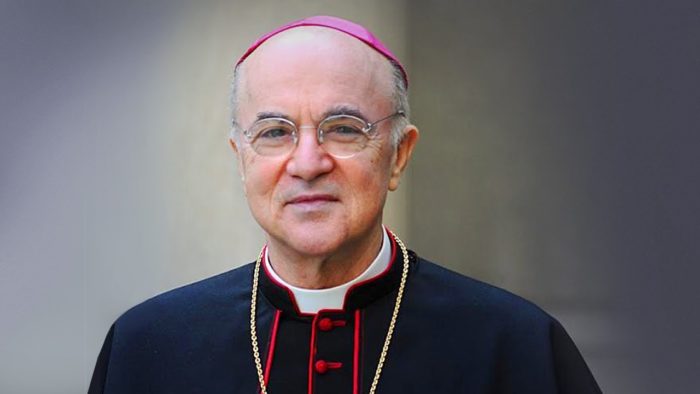20/05/2024
Arzobispo Carlo Maria Viganò: “Los globalistas quieren hacernos a todos lo que los israelíes están haciendo a los palestinos”
 Esto no es un campo de prisioneros durante la Segunda Guerra Mundial, no es un campo de concentración durante el Holocausto, es Gaza hoy, en 2024.
Esto no es un campo de prisioneros durante la Segunda Guerra Mundial, no es un campo de concentración durante el Holocausto, es Gaza hoy, en 2024.
Es nuestro futuro inmediato. Es lo que nos tienen reservado las élites satánicas globalistas a todos los que consideren un estorbo en el camino de su régimen de dominación y esclavitud. Exterminar y esclavizar a la humanidad: ese es el plan.
Henry Makow (*): “Quieren nuestras almas. Los globalistas quieren hacernos a todos lo que los israelíes están haciendo a los palestinos. Y a través de nuestro apoyo a Israel, les damos el derecho moral de devastarnos”.
(*) https://es.wikipedia.org/wiki/Henry_Makow
En un discurso este mes en Italia, el arzobispo Carlo Maria Viganò dijo: “Pretender que estamos tratando con viles comerciantes interesados sólo en el dinero y negarnos a ver la matriz satánica del plan globalista es un error imperdonable que ninguno de nosotros puede cometer. ”
Texto completo del discurso pronunciado el 10 de mayo por el arzobispo Carlo Maria Viganò en el Auditorio Gavirate en Varese, Italia:
MIRANDO MÁS ALLÁ
Una aproximación “forense” al crimen psicopandémico
Declaración para el Congreso “Muerte negada”
Auditorio Gavirate (Varese, Italia), 10 de mayo de 2024
Tienes al diablo como tu padre
y quieres cumplir los deseos de tu Padre.
Fue homicida desde el principio
y no perseveró en la verdad,
porque no hay verdad en él.
Cuando habla mentira, de suyo habla,
porque es mentiroso y padre de mentira.
Juan 8:44
Uno de los efectos más inmediatos de la infernal y manipuladora operación de psicopandemiaes la negativa de las masas a reconocer que han sido objeto de un fraude colosal. Con el pretexto de impedir la propagación de un virus, presentado como mortal e incurable -y que ahora sabemos que nunca ha sido aislado según los postulados de Koch-, miles de millones de personas se han visto obligadas a someterse a la inoculación con un fármaco experimental que se sabía ineficaz para su propósito declarado. Y para lograrlo, las autoridades responsables no han dudado en desacreditar tratamientos existentes que habrían hecho imposible autorizar la venta de ese suero genético.
La razón de este rechazo instintivo de las masas a reconocerse como víctimas de un y verdadero crimen contra la humanidad no elimina, sin embargo, la evidencia de las intenciones de los autores de este crimen. Estas intenciones, declaradas durante décadas sobre la base de una grotesca falsificación de la realidad, se materializan en una acción sistemática destinada a favorecer la despoblación del planeta a través de pandemias, hambrunas, guerras, enfrentamientos entre diferentes sectores de la población, el empobrecimiento de los más débiles, y la drástica reducción de aquellos servicios públicos –entre ellos la salud y la seguridad social– que el Estado debería garantizar a sus ciudadanos.
El Instituto Bill y Melinda Gates para la Población y la Salud Reproductiva es uno de los principales artífices de un plan de reducción demográfica que parte del supuesto neomalthusiano de que la población de la Tierra debe reducirse drásticamente y que sus alimentos y recursos energéticos deben ser objeto de intervenciones que favorezcan esta reducción. Las declaraciones que confirman este plan de exterminio ya ni siquiera se ocultan; por el contrario, se reiteran explícitamente en las conferencias y estudios producidos por la red de organizaciones e institutos financiados por autoproclamados filántropos.
Pero si un lobby de gente muy rica declara que quiere reducir la población mundial mediante vacunaciones masivas que causan esterilidad, enfermedades y muerte; y si estas vacunas realmente causan esterilidad, enfermedades y muerte en millones de personas inoculadas, creo que todos deberíamos ampliar nuestros horizontes -y dirijo mi llamamiento a distinguidos juristas e intelectuales, así como a médicos y científicos- y no nos limitemos a una investigación que tiene como único objeto los efectos adversos y mortales del suero experimental. Si no situamos la organización de la psicopandemia en el contexto más amplio del plan criminal que la concibió y diseñó, nos excluiremos de la posibilidad no sólo de comprender que se trató de un crimen premeditado, sino también de ver en qué otros frentes somos o seremos objeto de nuevos ataques, todos los cuales tienen el mismo objetivo final: la eliminación física de miles de millones de personas.
Las fallas en el sistema generalizado de censura que se está estableciendo en casi todos los estados occidentales –o más bien, en aquellos que están sujetos a los dictados de la OMS y el paraguas subversivo del Foro Económico Mundial– nos han permitido a muchos de nosotros ver la demostración de un hecho indiscutible: estos sueros –producidos por agencias gubernamentales utilizando virus genéticamente modificados mediante investigaciones de ganancia de función y que están sujetos al secreto militar– no sólo no sirven para curar la enfermedad fantasma de Covid-19, sino que también inducen efectos adversos graves e incluso la muerte; y esto no sólo se debe a la nueva tecnología de ARNm con la que se producen, sino también a la presencia de sustancias que no tienen relevancia para el propósito declarado de combatir el virus. Sustancias –incluido el óxido de grafeno– que casualmente fueron patentadas mucho antes del lanzamiento de la operación pandémica –un detalle, cuando menos, inquietante.
Por lo tanto, dado que estos sueros no hacen aquello para lo que fueron declarados cuando fueron aprobados por los distintos organismos sanitarios, sino que resultan muy eficaces para inducir patologías incluso muy graves, provocar la muerte y lograr la esterilización de los inoculados, es necesario dar el siguiente paso –que es el más temido por el sistema que las impuso– y denunciar la malicia y la premeditación –la mens rea, como dirían los juristas– de quienes deliberadamente utilizaron una falsa pandemia para exterminar la población, consistente con una visión loca y antihumana que considera a la humanidad como el cáncer del Planeta.
Por eso os invito a dar el siguiente paso en esta loable operación de verdad y denuncia en la que estáis comprometidos valientemente.
No hagáis las preguntas equivocadas, porque obtendréis respuestas equivocadas. Si asumís que las autoridades sanitarias han actuado con fines lícitos y que los errores cometidos se deben a la impericia o a la presión de la emergencia; si dáis por sentado que los productores de suero genético tienen como objetivo curar enfermedades y no el lucro más cínico y la creación de enfermos crónicos, terminaréis falsificando la realidad, y las conclusiones a las que lleguéis serán necesariamente engañosas. En su lugar, adopten un enfoque forense, por así decirlo, para que sea evidente que existe una perfecta coherencia entre las herramientas adoptadas y los resultados obtenidos, independientemente de sus objetivos declarados; sabiendo que sus verdaderas motivaciones, precisamente por su deseo intrínseco de hacer daño, debían ser ocultadas y negadas. ¿Quién admitiría alguna vez, antes de imponer fraudulentamente un tratamiento genético masivo, que su objetivo era enfermar, esterilizar o matar a un segmento muy grande de la población mundial?
Pero si esto es lo que pretende lograr la ideología neomalthusiana; si hay pruebas de que se han ocultado maliciosamente los efectos adversos de los sueros; si en los distintos lotes hay sustancias que no tienen ninguna justificación profiláctica sino que, por el contrario, inducen patologías y permiten manipular el ADN humano, las conclusiones lógicas no pueden dejar de poner de relieve la voluntad criminal detrás de la operación y, por tanto, la complicidad culpable de la opinión pública, instituciones, entidades privadas, incluso los líderes de la Jerarquía Católica, los medios de comunicación, el poder judicial, la Policía, las Fuerzas Armadas y toda la clase médica –salvo rarísimas excepciones– en una operación de exterminio masivo.
La pregunta que debemos plantearnos ahora –y que debemos formular a quienes dicen gobernarnos e imponernos normas y comportamientos que afectan directamente a nuestra vida cotidiana y a nuestra salud– no es por qué se han impuesto los sueros, aunque sean manifiestamente nocivos y mortales, sino más bien por qué ningún órgano del Estado –cuyo fin último debería ser el bien común, la salud y el bienestar de sus ciudadanos– ha puesto fin a este crimen, sino que se ha convertido en cómplice de él, llegando incluso a violar los derechos fundamentales y pisotear la Constitución.
Y una vez comprendida la complicidad del Poder Judicial, el Parlamento, el Gobierno y el Jefe de Estado, debemos preguntarnos cuál puede y debe ser la respuesta de los ciudadanos, a quienes el artículo 1 de la Constitución reconoce como únicos titulares de la soberanía nacional al estar ante un acto subversivo y una traición de quienes están en el poder.
Quis custodiet ipsos custodes? pregunta Juvenal ( Sátiras , VI, 48-49).
Si un sistema de gobierno llega a estructurarse de tal manera que quienes están constituidos en autoridad pueden dañar a quienes deben obedecerlos; si fuerzas no legitimadas por ningún mandato político o social logran maniobrar gobiernos enteros e instituciones supranacionales con la intención de apropiarse del poder y concentrar en sus manos todos los instrumentos de control y todos los recursos: finanzas, salud, justicia, transporte, comercio, alimentación, educación, información; si una entidad subversiva puede presumir públicamente de tener primeros ministros, ministros y funcionarios a su servicio, debemos abrir los ojos y denunciar el fracaso de ese pacto social que es base de la convivencia civil y que legitima la delegación de autoridad por parte del pueblo a sus representantes. Y de aquí, inevitablemente, debe surgir la conciencia de que la pandemia –así como la emergencia climática y todas las demás pseudocatástrofes previstas con fines intimidatorios por el mismo lobby– constituye una pieza fundamental en el marco de un golpe de Estado global más amplio. Estado al que hay que oponerse, que es imprescindible denunciar, y cuyos perpetradores –tanto en las cúpulas de estas organizaciones subversivas como en los gobiernos, las instituciones públicas y los niveles más altos de la Iglesia católica– serán inexorablemente juzgados y condenados por alta traición. y crímenes contra la humanidad.
Pero para ello –habrá que reconocerlo después de cuatro años– es esencial comprender que este lobby criminal actúa para el Mal, sirve al Mal y persigue la muerte no sólo del cuerpo sino también del alma de cada uno de nosotros; que sus emisarios son servidores de Satanás, dedicados a la destrucción de todo lo que se asemeje aunque sea remotamente a la obra perfecta de la Creación, todo lo que se refiera al acto generoso y gratuito con el que el Creador infunde Vida. Satanás es asesino desde el principio (Jn 8,44), y quienes le sirven no pueden hacer otra cosa que desear la muerte, cualquiera que sea el medio con el que se la inflija.
Pretender que estamos tratando con viles comerciantes interesados sólo en el dinero y negarnos a ver la matriz satánica del plan globalista es un error imperdonable que ninguno de nosotros puede cometer, si realmente queremos detener la amenaza que se cierne sobre toda la humanidad. Por esto os aseguro mis oraciones y os imploro la bendición de Dios y el patrocinio de la Santísima Virgen, Salus Infirmorum .
Carlo Maria Viganò, Arzobispo
Enviado desde Alerta Digital









Un informe completo , veraz ,y que se refiere directamente al lobby judio que esta perpetuando un holocausto verdadero en Gaza .
Monseñor Viganò, eternamente agradecidos por sus valientes y certeras palabras, y por sus oraciones por todos los enfermos y fallecidos que ha causado esta satánica pandemia. Los despachos de abogados se están llenando de miles de denuncias particulares que aportan pruebas definitivas. El proceso está en marcha en todos los países. La Justicia existe y en ella confiamos.
Más personas como Monseñor Viganò necesita la Iglesia Católica Apostólica y Romana y menos como Bergoglio que ni a mi ni a muchísimos cristianos nos representa por sus ideas soeces que en en nada se parecen al mandato de Nuestro Señor y sí al mandato de Judas Iscariote, que es el que parece que gobierna en la sobra de todos estos gobiernos putrefactos globalistas que nos tratan de esclavizar cada día un poquito más con sus planes y Agendas siniestras.
Dios lo proteja